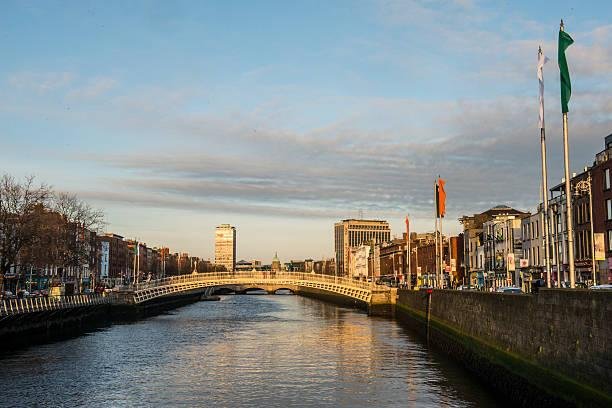Many people ask, “Is Dublin in the UK?” with good reason given the historical connection and proximity between Ireland and the UK.
However, the answer is no—the capital city of an independent country known as the Republic of Ireland is called Dublin, not the UK. Knowledge of its location and the distinction between Ireland and the UK will remove all the confusion.
Let us explore further into the geography, political history, and other related factors and see why Dublin cannot be considered a part of the UK.
Key Takeaways:
- Dublin is Not in the UK: Dublin is the capital city of the Republic of Ireland, an independent country separate from the United Kingdom.
- Location in Ireland: Dublin is on the eastern coast of the Republic of Ireland, in the province of Leinster, far from Northern Ireland’s border.
- Historical Context: The Republic of Ireland, including Dublin, gained independence from the UK in 1921, following the Anglo-Irish Treaty.
- Currency Difference: Dublin uses the Euro (€), while Northern Ireland (UK) uses the British Pound (£).
- Part of the EU, Not Schengen: Dublin is a member of the EU but not part of the Schengen Zone, requiring passport checks for Schengen area travelers.
- Distinct Political Identity: The Republic of Ireland and Northern Ireland are separate entities, with Dublin being the center of Irish governance and culture.
- Economic Hub: EU membership has made Dublin a hub for global tech companies, contributing to its status as Ireland’s economic and cultural center.
- Travel and Immigration: Travelers need a separate Irish visa to enter Dublin; UK visas are not valid for entry into the Republic of Ireland.
Which Country Does Dublin Belong To?
Dublin is the capital city of the Republic of Ireland. The island of Ireland is divided into two entities – the Republic of Ireland – in which Ireland itself lies – and Northern Ireland, a part of the United Kingdom. Dublin is located in the Republic of Ireland, thus holding political, cultural, and economic centrality.
The Republic of Ireland is an independent country that gained its full independence from the United Kingdom in 1949. As a result, the city of Dublin was part of the Republic of Ireland and had no influence whatsoever on the UK.

Historical Background As history has it, the entire island of Ireland was colonized by Britain. But shortly after the Anglo-Irish Treaty in 1921, Ireland was divided into two undoubtedly separated political entities: Northern Ireland, which remained part of the United Kingdom, and the Irish Free State, which later on became the Republic of Ireland.
This led to the definitive separation officially ending Dublin as an associate of the United Kingdom.
The division gave rise to two capitals: the capital of Northern Ireland (UK), Belfast, and the capital of the Republic of Ireland, Dublin.
Is Dublin in the EU?
Yes, Dublin is part of the European Union (EU). The Republic of Ireland became part of the EU, then known as the European Economic Community, in 1973. Unlike the United Kingdom, which recently 2020 left the EU, it continues to be a dedicated member of the union.
This membership to the EU allows the city of Dublin to benefit from privileges such as free trade, freedom of movement within the EU, and the chance of reaping some funding from European programs.
However, Ireland, the town of Dublin included, is not covered under the Schengen Agreement; it is outside the passport-free zone of the Schengen Area.
Impact of EU Membership on Dublin
Dublin has many economic and social programs because of its membership in the EU. The city has been an attraction to various multinational companies, such as Google Facebook, and even Amazon.
It is now a hub for technology and business. The status of the EU ensures that the residents of the city can live, work, and travel without restriction across other EU member states.
Where is Dublin in Ireland?
It is on the east coast of Ireland along the Irish Sea. This city falls in the province of Leinster, being seated at the mouth of the River Liffey.
Geographically speaking, Dublin is miles away from the border that separates Ireland from Northern Ireland; therefore, there’s no confusion as to whether it belongs to Northern Ireland.

Its coastal position has, however, made it an important port city with historically significant influence on trade, commerce, and tourism.
Geographic Relationship to Other Major Cities
- Belfast (the capital of Northern Ireland): 167 kilometers (104 miles) North
- Cork (Republic of Ireland): 257 kilometers (160 miles) Southwest.
- London (UK): 467 kilometers (290 miles) East. Dublin is situated on the Irish Sea.
Is Dublin in Northern Ireland?
No, Dublin is not Northern Ireland. It is quite important to note the difference between Northern Ireland and Dublin. Northern Ireland is one of four states in the UK, the other three being England, Scotland, and Wales.
Northern Ireland has its very own capital Belfast. The Republic of Ireland contains Dublin as a part of a distinct, independent nation separate from the UK.
The Difference Between Northern Ireland Vs the Republic of Ireland
The separation of Northern Ireland from the Republic of Ireland is founded on differences in terms of politics and history. It was during 1921 when Ireland had partitioned itself.

The south was made into the Irish Free State whereas the north part of the division remained as a part of the UK. There is still much discussion over the border separating Northern Ireland from the Republic of Ireland, especially about trading and traveling in the post-Brexit scenario.
Is Dublin Located in Northern Ireland or Southern Ireland?
In this connection, of course, lies a political definition, as Dublin is said to be located in “Southern Ireland,” a name often used to differentiate the country from Northern Ireland.
On the other hand, “Southern Ireland” does not represent an official term and is, therefore misleading. The correct way to refer to where Dublin comes from is in the Republic of Ireland.
Two distinct regions the Republic of Ireland and Northern Ireland-and each has a form of political structure, currency, and governance that differs from the other.
Does Dublin belong to Schengen?
No, it doesn’t. The city belongs to the EU, but Ireland has not signed the Schengen Agreement. This means border controls exist between Dublin and other countries within the Schengen Area.
Ireland did so because it wanted to keep good relations with the UK. Now that the UK hasn’t agreed to do the same, Ireland is left out in the cold.
As a result, while you are at liberty to roam the Schengen countries of the EU, you will need a passport if you wish to enter or exit Dublin.
Dublin Money
Dublin uses the Euro (€). The Euro is the official currency of the Republic of Ireland, amongst many other European countries. This is different from Northern Ireland as the currency used here is the British Pound (£).
These differences in currency would need to be dealt with especially when traveling between Northern Ireland and Dublin.
Currency Difference: Euro vs. British Pound
Another apparent indication of their two distinct nationalities is the use of two different forms of currency between Dublin and Northern Ireland. The two locations exist on one island yet they have two separate financial systems.

| Feature | Dublin, Republic of Ireland | Northern Ireland, United Kingdom |
| Currency | Euro (€) | British Pound Sterling (£) |
| Currency Symbol | € | £ |
| ISO Currency Code | EUR | GBP |
| Used In | Republic of Ireland and most EU countries | United Kingdom (England, Scotland, Wales, and Northern Ireland) |
| Exchange Rate (Approximate) | 1 EUR ≈ 0.85 GBP | 1 GBP ≈ 1.18 EUR |
| Central Bank | Central Bank of Ireland | Bank of England |
| Denominations | Coins: 1c, 2c, 5c, 10c, 20c, 50c, €1, €2 Banknotes: €5, €10, €20, €50, €100, €200, €500 | Coins: 1p, 2p, 5p, 10p, 20p, 50p, £1, £2 Banknotes: £5, £10, £20, £50 |
| Currency Exchange | Required when traveling to the UK or Northern Ireland | Required when traveling to the Republic of Ireland or Eurozone countries |
| ATMs | Dispense Euros (€) | Dispense British Pounds (£) |
| Credit/Debit Card Acceptance | Widely accepted | Widely accepted |
| Bank Holidays | Follows Republic of Ireland bank holidays | Follows UK bank holidays |
Dublin County Population
Dublin County is Ireland’s most populous region, with a population of more than 1.3 million residents. The region incorporates city and suburb areas, including the city of Dublin and its suburbs.
Being Ireland’s economic center, Dublin has attracted people of all ages and places of origin from around the world. It is a vibrant, cosmopolitan city constantly growing in population and economic influence.
Ireland Currency
The whole country of Ireland uses the Euro as its legal tender. The Republic of Ireland was known to use the Irish Pound before the adoption of the Euro in the year 2002.
It is the adoption of the Euro marked an important step in Ireland’s integration into the economic framework of Europe. The Euro stability has made Ireland’s economy grow a lot easier for tourists who undertake travels across Europe.
Capital of Northern Ireland
Belfast is the capital of Northern Ireland. Dublin, however, is a city that belongs to the Republic of Ireland. Belfast belongs to the United Kingdom and differs from the identity of Dublin. The political landscape of the island of Ireland therefore very much to understand these facts.
Countries of the UK
The UK consists of four different nations: England, Scotland, Wales, and Northern Ireland. Not one of these nations contains Dublin as that is the capital of the Republic of Ireland.
The Republic of Ireland shares the same boundary as that of the UK on the island of Ireland but is an entirely different political entity.
FAQs
Is Dublin in the UK?
No, Dublin is categorized under no UK. It is the capital of the Republic of Ireland- an independent country on its own.
Does Dublin fall into the UK category?
No, it does not. Dublin falls under the Republic of Ireland, not the UK.
Is Ireland considered part of the UK or EU?
EU country Dublin is situated Republic of Ireland. The UK is a different thing altogether. Northern Ireland is part of the UK.
What country is Dublin in?
Dublin is a Republic of Ireland independent country not part of the United Kingdom.
Can I use my UK visa to go to Dublin?
No, you can’t use the UK visa to access Dublin. You’ll need an Irish visa because the Republic of Ireland does not share the same immigration policies with the UK.
Am I British if from Dublin?
No, people from Dublin are not British. They are Irish because Dublin is within the Republic of Ireland and not in the UK
Is it very expensive to live in Dublin?
Yes, Dublin is one of the most expensive cities in Europe. Accommodation, food, and traveling are rather expensive as well.
Do I need a visa for Dublin?
It depends on the nationality. Citizens from the EU countries and several other countries can visit Dublin without having any sort of visa. However, if you need a visa to visit the Republic of Ireland, you should make your application beforehand while planning the tour.
Is Dublin near London?
Dublin is not very close to London. The distance is about 290 miles (467 km), and it normally takes a flight or ferry travel.
When did Dublin exit the UK?
Dublin exited the UK in 1921 after the Anglo-Irish Treaty to implement the Irish Free State, currently referred to as the Republic of Ireland.
Conclusion
To put this all into easy words, is Dublin in the UK? No, Dublin is not in the UK. It is the capital of the Republic of Ireland and an independent country in its own right.
The city is found on the east coast of the Republic of Ireland and uses the Euro as its currency. It is in the European Union but not within the Schengen Zone.
Rich in history, people melting together, and strategically between Northern Ireland and the United Kingdom, knowing what differs can also clear confusion over Dublin’s political status and identity.
Dublin, being part of the Republic of Ireland and not part of the UK, you can find the richness of a unique culture and history bestowed upon such an amazing Irish city.








